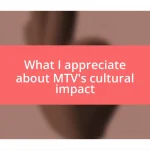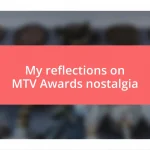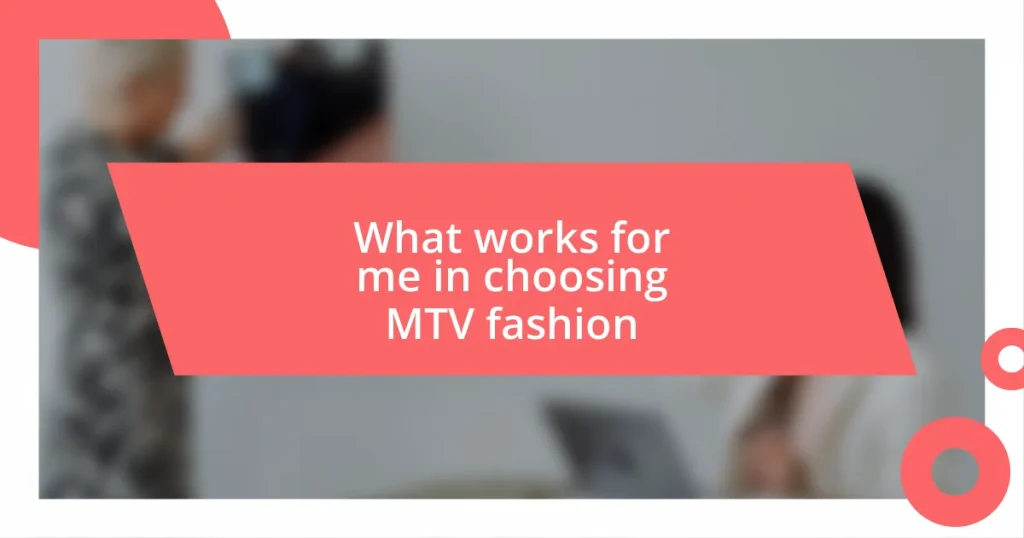Key takeaways:
- The 90s MTV era was a cultural phenomenon that shaped music, fashion, and social conversations, uniting friends through shared experiences.
- MTV introduced influential shows and artists, such as MTV Unplugged and Nirvana, that transformed music consumption and addressed social issues in profound ways.
- Nostalgia for 90s music helps individuals connect with their past, fostering a sense of belonging and reflection on personal growth and societal awareness.
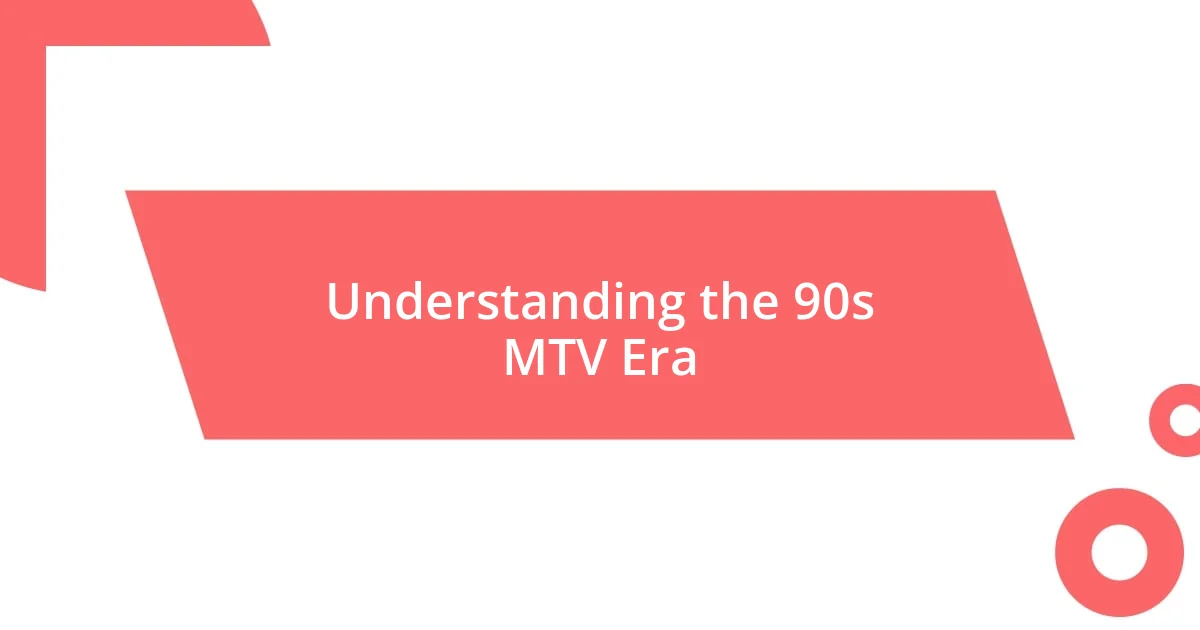
Understanding the 90s MTV Era
The 90s MTV era feels like a vivid moment frozen in time, doesn’t it? I remember rushing home after school to catch my favorite music videos, with the excitement buzzing in my chest. It was more than just a channel; it was a cultural phenomenon that shaped our musical tastes and fashion choices, isn’t that incredible?
Exploring that time, I can still hear the echoes of grunge, hip-hop, and pop reverberating through my teenage years. MTV didn’t just showcase artists; it created icons. I often wonder how a single video could catapult an artist to stardom overnight. For example, when Nirvana’s “Smells Like Teen Spirit” played, it felt like the anthem of my generation—a declaration of rebellion against conformity.
The influence of MTV extended beyond music—it impacted our lives and social conversations. I vividly recall the way conversations would flow among my friends the next day, dissecting everything from the lyrics to the cutting-edge visuals. It was a shared experience that united us, turning music into a backdrop for our own youthful journeys. How many friendships were built over debates about who ruled the screen, Madonna or the Spice Girls?

Influential Shows and Artists
I can’t help but reminisce about the shows that truly shaped the landscape of the 90s. Programs like MTV Unplugged changed the way we experienced live music. Watching my favorite bands stripped down to their essence felt intimate. I remember sitting in my living room, captivated as artists like Pearl Jam and Nirvana left their electric guitars behind for softer, more poignant versions of their hits. It was as if they were inviting us into their world.
The artists from this era were trendsetters whose influence extended far beyond music. Here’s a snapshot of some of the most important shows and artists that left a lasting mark:
- MTV Unplugged: Brought raw, acoustic renditions to mainstream audiences, making music feel accessible and personal.
- Total Request Live (TRL): This daily countdown show brought a sense of immediacy, allowing fans to connect with artists directly via their votes.
- Artists like Madonna: Pushed boundaries and transformed not just music, but also fashion and gender norms.
- Nirvana: Their unfiltered expression resonated with an entire generation, blending angst with authenticity.
- The Real World: Introduced reality TV that reflected real-life issues, eventually influencing countless shows that followed.
These shows and artists didn’t just entertain us; they taught us about expression, identity, and cultural conversations that were happening in real time. Music became a vessel for understanding the world around us. It’s fascinating how, even today, their stories continue to resonate within us.

Music Trends and Genres Explored
When I think about the music trends of the 90s, the diversity is what truly stands out to me. Grunge, hip-hop, pop, and alternative rock all coexisted, each bringing its own unique flavor to the airwaves. I remember blasting the upbeat tracks of Britney Spears while simultaneously feeling the raw power of bands like Soundgarden. It was like having my musical cake and eating it too, all in one era. The way these genres blended together created something special; I felt empowered to express different sides of my personality—all influenced heavily by what I watched on MTV.
As I look back, it’s clear that music videos were more than just entertainment; they were a critical part of marketing and personality creation for artists. I can still recall the extravagant visuals of TLC’s “Waterfalls” or the striking imagery in Madonna’s performances. They pushed boundaries and challenged social norms. It wasn’t just about listening to a song; it was an experience—a vibrant merging of sound and sight that resonated with my emotions. Do you ever find yourself reminiscing about the unforgettable moments those videos created? I know I do, and they were pivotal in how I began to understand creativity and art.
The impact of these trends still lingers today. Genres that began in the 90s continue to evolve, a testament to their lasting influence. For me, it wasn’t just about the music; it was a multifaceted experience that shaped my views on artistry and culture. I often reflect on how discovering a new genre felt like opening up a secret world. It’s like each time a new artist or song emerged, it added another layer to my understanding of what music could be.
| Music Trend | Key Characteristics |
|---|---|
| Grunge | Raw, angst-filled lyrics and a DIY aesthetic, exemplified by bands like Nirvana and Pearl Jam. |
| Hip-Hop | Rhythmic vocal style that often tackles social issues, with artists like Tupac and Notorious B.I.G. leading the charge. |
| Pop | Catchy melodies and high production values with stars like Britney Spears and Backstreet Boys dominating the charts. |
| Alternative Rock | A blend of punk, pop, and indie influences focusing on originality, as seen in bands like Radiohead and R.E.M. |

Cultural Impact of MTV
The cultural impact of MTV in the 90s was monumental, weaving itself into the very fabric of youth identity. I remember feeling an instantaneous connection to issues of social justice and self-acceptance, sparked by the groundbreaking content that aired. When I first saw artists like Lauryn Hill share their truths, it opened my eyes to experiences outside my own bubble, reflecting struggles many faced but weren’t openly discussed.
MTV didn’t just showcase music; it became a forum for cultural expression. I can vividly recall the fervor during the MTV Video Music Awards, where every performance seemed to reverberate with meaning—each act a declaration of identity and defiance. Watching artists challenge stereotypes and push norms made me realize that music could be a vehicle for social change. Can’t you feel the energy that ignited conversations about race, gender, and sexuality? It was electric, and it felt necessary.
Ultimately, MTV brought diverse voices to the forefront, encouraging us to think critically about the world around us. The funky, avant-garde visuals and fiery performances felt like a manifesto, urging us to embrace our true selves. Remember the first time you heard a song that made you feel understood? That’s the magic of what MTV helped cultivate—an inviting space for exploration, creativity, and heartfelt dialogue in a world that often feels like it pushes us toward conformity.
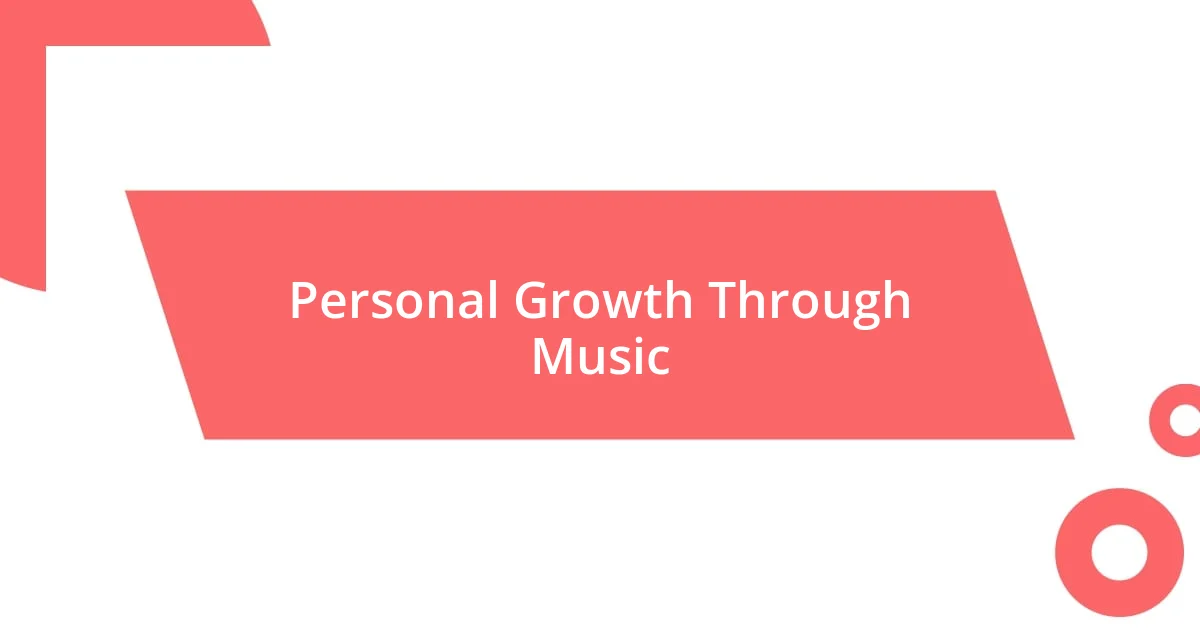
Personal Growth Through Music
Music has an uncanny ability to mirror our emotions, and I realized this profoundly during my teenage years. I remember tuning into Nirvana’s “Smells Like Teen Spirit” like it was a personal anthem for a generation lost in turmoil. That song—and others like it—articulated feelings of confusion and rebellion I couldn’t quite vocalize. It wasn’t just about listening; it was a source of solace, helping me navigate the often chaotic landscape of adolescence.
As I grew older, I noticed how songs from artists like Alanis Morissette taught me the importance of vulnerability and honesty. Her raw lyrics resonated with me on a deep level, opening my eyes to the power of sharing one’s truth. Do you recall a moment when a track moved you to tears or made you feel utterly seen? That was my experience with “You Oughta Know.” It gave me permission to feel and express my own struggles, showcasing how music can be a profound catalyst for emotional growth.
I also found that the diverse narratives woven into 90s music helped me expand my worldview. Listening to artists like Tupac introduced me to experiences outside my own, making me reflect on social justice and empathy. This wasn’t just about enjoying a catchy beat—it was about understanding the stories behind those beats. It encouraged me to engage with the world around me, questioning norms and cultivating a sense of awareness in my own journey. How has music shaped your perspective on the issues that matter in life? I believe it serves as a constant reminder that we are all connected through the struggles we share.
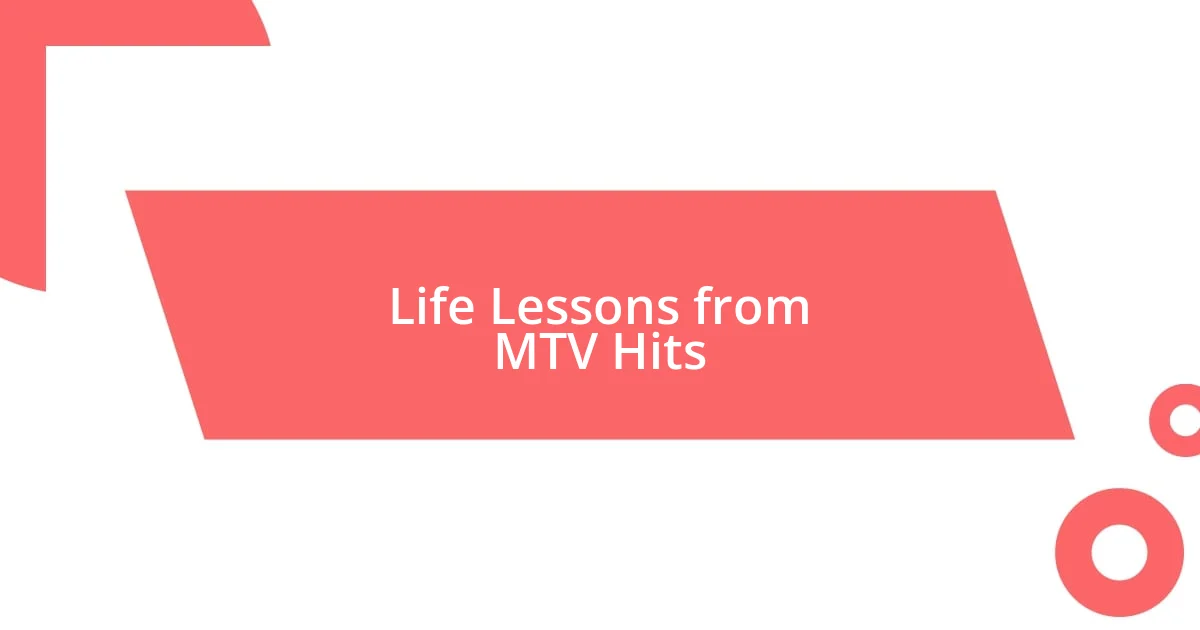
Life Lessons from MTV Hits
There’s something profoundly impactful about the lessons embedded in 90s MTV hits. For example, when I first listened to TLC’s “Waterfalls,” it was more than just a catchy tune; it was a poignant narrative warning against risky behaviors and choices. Can you remember a time when a song made you rethink a decision? That moment for me was eye-opening—I started to recognize the importance of making thoughtful choices and understanding the consequences of our actions.
One of the biggest life lessons I took away from the countless hours spent watching MTV was the value of standing out. I could relate deeply to the message in “Just a Girl” by No Doubt, which spoke to self-identity and the constraints society often places on us. It was a liberating feeling to hear such a relatable anthem. Have you ever found empowerment in a song? I channeled that confidence into my own life, encouraging me to push against societal expectations and embrace my individuality unapologetically.
Moreover, the interplay of tales about love and heartbreak in 90s hits taught me resilience. For instance, when I found solace in Boyz II Men’s “End of the Road,” I realized that dealing with loss is part of life’s journey. I remember the tears I shed during those heart-wrenching lyrics, understanding that it’s okay to grieve and heal at your own pace. Does music help you process your emotions too? It’s fascinating how these songs sparked reflections on my relationships and taught me that vulnerability is not a weakness but a vital part of truly connecting with others.
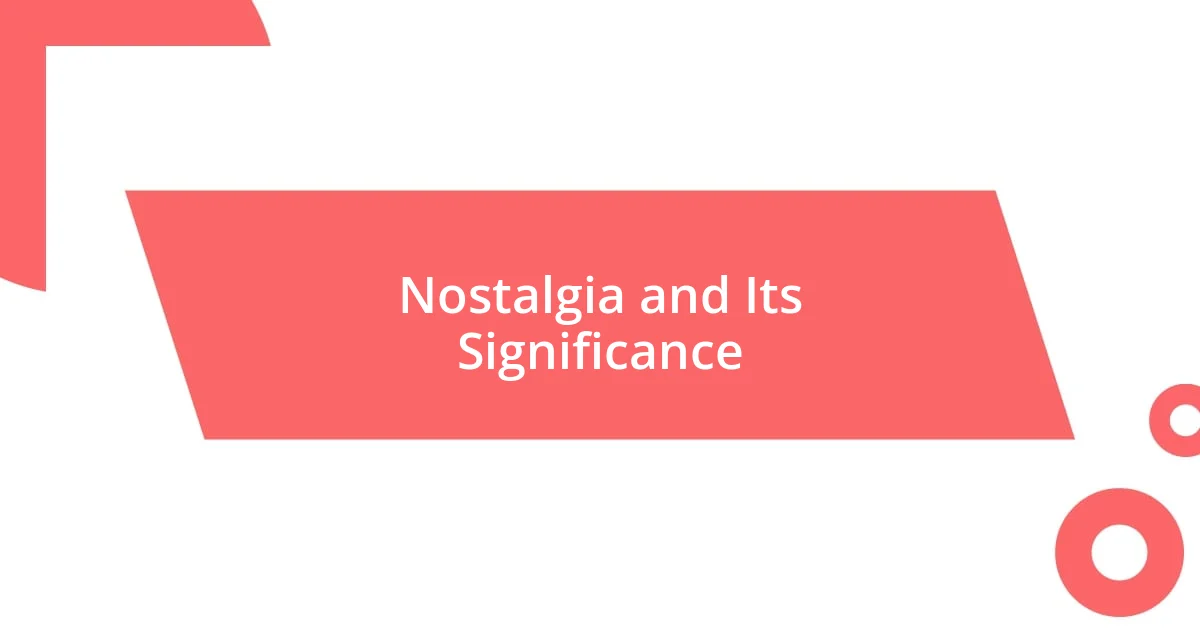
Nostalgia and Its Significance
Nostalgia plays a significant role in shaping our identities and memories. When I hear the opening notes of a classic 90s track, I’m immediately transported back to a specific time and place, often bringing with it a wave of emotions. It’s intriguing how a simple song can unlock memories I thought were long gone, making me feel both joy and longing. Have you ever had a moment where a song brought back a flood of memories? It’s almost like a time machine for the heart.
This yearning for the past isn’t merely sentimental; it reveals our connections to who we are today. I find that reflecting on my experiences with 90s music helps me understand my journey. It serves as a backdrop for key moments in my life—like dancing with friends at summer parties or singing at the top of my lungs in the car. Those memories are pieces of a puzzle that have crafted my story, showing me how each moment, no matter how small, has influenced my perspective. Do you cherish similar memories? They serve as reminders of growth and transformation.
Moreover, nostalgia fosters a sense of belonging. When I share my love for 90s hits with others, I can instantly bond over songs that shaped our generation. There’s a comforting unity in recalling the lyrics or melodies that once brought us joy. It affirms that we are not alone in our experiences, further solidifying our connections with others. How often do you reminisce about those days? I believe that collectively embracing our nostalgic moments enriches our lives and deepens our relationships.



